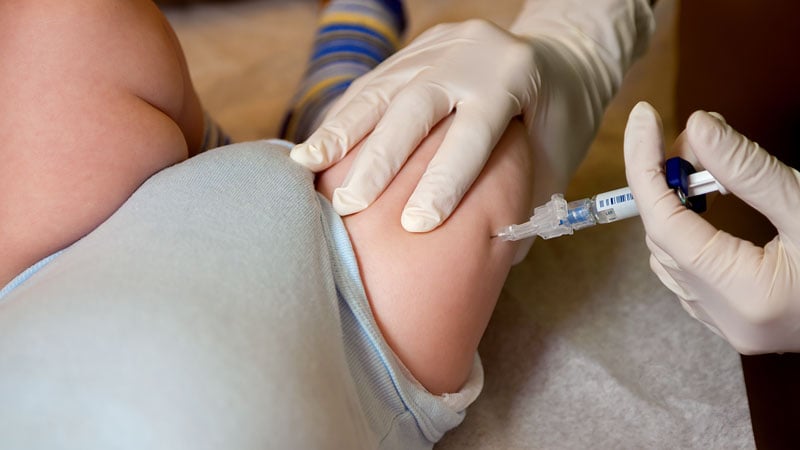15-Valent Pneumococcal Vaccine Shows Promise in Infants - Medscape

Last week Merck announced topline results from a phase 3 pivotal trial in which a four-dose regimen of the 15-valent pneumococcal conjugate vaccine Vaxneuvance (PCV15) met key immunogenicity and safety endpoints for healthy infants aged 2 to 15 months. The announcement of the study findings follows a US Food and Drug Administration (FDA) win for Vaxneuvance. In July, the 15-valent pneumococcal vaccine was approved for the prevention of invasive pneumococcal disease in adults.
Despite the positive impact pneumococcal conjugate vaccination has for pediatric patients, globally, pneumococcal disease continues to cause serious illness and death among children younger than 5 years. Currently, pneumococcal vaccines for children cover up to 13 pneumococcal serotypes; Vaxneuvance expands coverage to serotypes 22F and 33F.
"Our goal is to expand vaccine coverage to new serotypes not targeted by currently available pediatric pneumococcal conjugate vaccines while maintaining immune responses to current vaccine serotypes to help sustain progress achieved to date," said Paula Annunziato, MD, vice president and therapeutic area head of vaccines clinical research at Merck, in an email to Medscape Medical News.
Annunziato explained that there are 100 types of pneumococcal bacteria and that they can affect children differently from how they affect adults. "Children under the age of 2 are particularly vulnerable to pneumococcal infection, and incidence of invasive pneumococcal disease remains highest in the first year of life," she said. "Certain pneumococcal serotypes continue to put children at risk, including serotypes 22F, 33F, and 3, which represent more than a quarter of all cases of invasive pneumococcal disease in children under the age of 5."
The company's PNEU-PED (V114-029) study (NCT03893448) evaluated a four-dose regimen of Vaxneuvance and compared safety and immunogencity outcomes with those of the licensed 13-valent pneumococcal conjugate vaccine (PCV13) in 1720 healthy infants who were enrolled at 42 to 90 days of age. The vaccine doses were administered at 2, 4, 6, and 12 to 15 months of age.
Vaxneuvance demonstrated a safety profile comparable to that of PCV13 following any vaccine dose. At 30 days after the third dose, Vaxneuvance was found to be noninferior to PCV13 for all 13 shared serotypes, as determined on the basis of serotype-specific response rates. It was also noninferior to 12 of the 13 shared serotypes, as determined on the basis of serotype-specific immunoglobulin G geometric mean concentrations. Similar findings were reported at 30 days following the fourth dose.
Although pneumococcal conjugate vaccines may reduce the incidence of pneumococcal infections, the immune protection conferred by the pneumococcal conjugate vaccines is serotype specific. The currently available 13-valent vaccine is effective against pneumococcal infections caused by the 13 serotypes included in the vaccine, but currently, most cases are caused by serotypes not included in this 13-valent vaccine, explained Liset Olarte, MD, Children's Mercy Kansas City, in Kansas City, Missouri.
Olarte, who served as a principal investigator at Children's Mercy Kansas City in the pediatric Merck trial, told Medscape Medical News in an email that serotype 3 has been responsible for a significant proportion of cases of invasive pneumococcal disease in the past few years. In the PNEU-PED study, Vaxneuvance showed superior immune response for shared serotype 3, in addition to the unique serotypes 22F and 33F. "It is thought that this may be due to the highly mucoid phenotype of serotype 3, which prevents antibody-mediated clearance," said Olarte. "Whether the PCV15 superior immune response to serotype 3 will further decrease the incidence of infections caused by serotype 3 remains to be determined."
The FDA approved Vaxneuvance on July 16 for active immunization in adults for the prevention of invasive disease caused by 15 Streptococcus pneumoniae serotypes. This approval was based on data from seven randomized trials that showed that the vaccine was noninferior to PCV13 for the shared 13 serotypes in terms of safety, tolerability, and immunogenicity in adults aged 18 years and older. According to Annunziato, Merck plans to submit a supplemental regulatory licensure application to the FDA for use in children before the end of this year.
A spokesperson for Merck says the company has submitted an application to the European Medicines Agency for Vaxneuvance for use in adults and expects an approval decision in early 2022.
Olarte serves Children's Mercy Kansas City, a site involved in the PNEU-PED study, and was a principal site investigator in the trial.
Brandon May is a freelance medical journalist who has written more than 1800 articles for medical publications in the United States and the UK. He resides in downtown Brooklyn, New York City. Twitter: @brandonmilesmay.
For more news, follow Medscape on Facebook, Twitter, Instagram, and YouTube.

Comments
Post a Comment